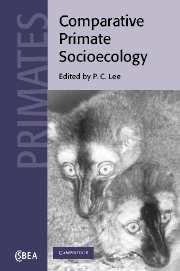Editor's conclusion: Socioecology and social evolution
Published online by Cambridge University Press: 24 August 2009
Summary
Each of the chapters in this book aims to address a problem of major theoretical importance in relation to primates, their ecology, evolution and social diversity. The central thrust is comparative, either at the gross level of interspecific variation or at the more fine-grained intraspecific level. Some issues will remain unresolved until further information on the less well-known species is available; others may simply be too deeply rooted in the phylogenetic history of the primates to be explored effectively at the kind of levels emphasised in this book. Furthermore, the more we know about how different populations, or even social units, within a species vary, the more difficult it becomes to construct satisfactory generalised causal explanations for social system evolution.
What are the major issues in primate socioecology, and how have the chapters in this book helped to address them? We now have a better feel for the interaction between group size and social system, an issue that has long been conflated. If group size represents solutions to problems of intergroup competition within an ecologically tolerable range of sizes, then we can predict what range of group sizes should be expected (Williamson and Dunbar, Chapter 12). However, there is a further issue not explored here in depth, that of predation and its independent effects on group size. Predation can also be an extrinsic pressure on group size, as has long been noted. But neither predation nor ecologically sensitive group sizes fundamentally determines internal group structures; these are a consequence of the needs of females to ensure resources in order to maximise fertility and of the needs of males to maximise access to mates.
- Type
- Chapter
- Information
- Comparative Primate Socioecology , pp. 406 - 409Publisher: Cambridge University PressPrint publication year: 1999

